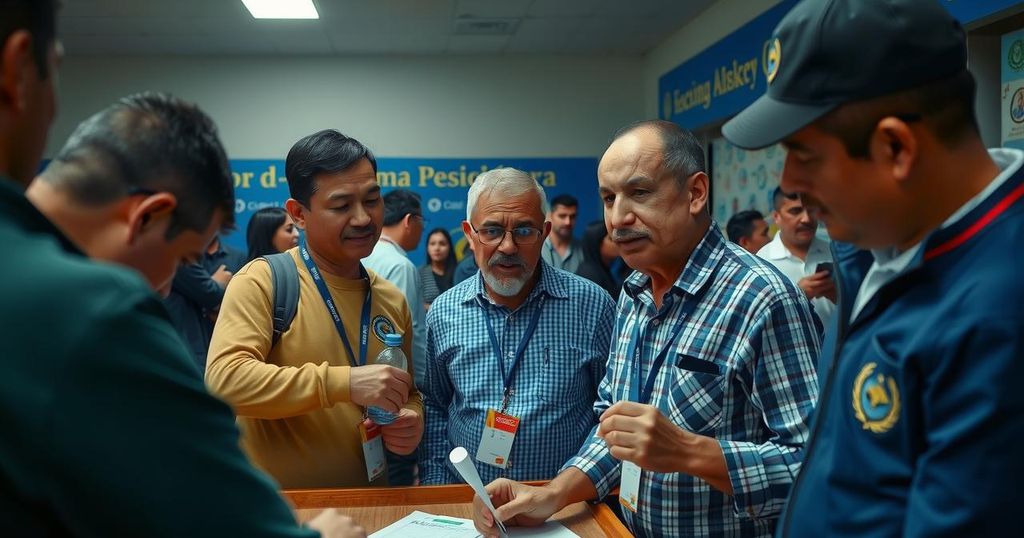World news
2024 ELECTIONS, ARGENTINA, ASIA, BRAZIL, BRICS, COLORADO PARTY, CUBA, DELGADO, ELECTION, ELECTIONS, FRENTE AMPLIO, JOSE “ PEPE, LUIS LACALLE POU, MEXICO, MUJICA, NATIONAL PARTY, NORTH AMERICA, OR, PHILIPPINES, PRESIDENTIAL ELECTION, SOUTH AMERICA, TRADE RELATIONS, URUGUAY, VENEZUELA, VOTER TURNOUT
Elena Martinez
0 Comments
Uruguayans Cast Votes in Presidental Run-Off Amid Political Tensions
Voting in Uruguay’s presidential run-off features a contest between leftist candidate Yamandu Orsi and right-wing Alvaro Delgado. With initial polls indicating a close race and no significant new pledges from either side, the outcome could signal whether the nation diverges from a global trend of incumbent party decline amidst economic challenges.
Voting is currently taking place in Uruguay’s presidential run-off election, where the leftist coalition led by former President José Mujica seeks to regain power after five years of right-wing governance. The electorate will determine the successor between Yamandu Orsi of the Frente Amplio (Broad Front) and Alvaro Delgado, representing the National Party, part of the outgoing President Luis Lacalle Pou’s Republican Coalition. Polling stations opened at 8:00 AM local time and are set to close at 7:30 PM, with initial results anticipated shortly thereafter.
As the population of approximately 3.4 million prepares to vote, opinion polls indicate a close contest, suggesting less than 25,000 votes may separate the candidates. Unlike the polarizing political atmospheres observed in neighboring countries such as Argentina, Brazil, and Mexico, Uruguay maintains a relatively harmonious political landscape, characterized by some overlap between conservative and liberal factions.
President Lacalle Pou has enjoyed a commendable approval rating of 50 percent; however, his administration has faced challenges regarding public safety despite improvements in employment and wage growth. Orsi, who garnered 43.9 percent of the vote in October, has previously served as mayor of Canelones. However, he has promised not to initiate drastic changes in policy, aiming to maintain the nation’s financial stability. On the other hand, Delgado, who secured 26.8 percent of the first-round votes, aims to preserve the current administration’s successes while acknowledging that he cannot succeed Lacalle Pou due to constitutional limitations on re-election.
Both candidates are focused on attracting the 8 percent of voters who favored smaller, unaligned parties in the initial round as well as those who abstained from voting. Notably, Orsi’s party succeeded in securing a Senate majority, which he believes positions him advantageously for governance. However, neither candidate has introduced fresh policy proposals recently, and a recent televised debate appears to have yielded minimal impact on public opinion.
As the conclusion of an election year approaches globally, observers will be assessing whether Uruguay diverges from the trend of incumbent parties losing voter support amid rising inflation and economic distress that has influenced electoral outcomes in various nations.
The political climate in Uruguay is currently characterized by a significant electoral contest as the country undergoes a presidential run-off election. The election features the leftist Frente Amplio coalition led by José Mujica’s former ally competing against the National Party, which represents the ruling coalition under President Luis Lacalle Pou. The political landscape here is notably less contentious than in other Latin American countries, reflecting a unique approach in tackling socio-economic issues, and people are eager to see if the leftist alliance can reclaim power following five years of rightist governance.
In summary, the Uruguayan run-off election holds significant implications for the nation’s political future, pitting a leftist coalition seeking a return to power against a ruling right-wing administration. The closeness of the race, coupled with the absence of substantial new policy proposals from both candidates, suggests a pivotal moment for Uruguay as voters navigate their choices in an atmosphere of economic uncertainty and changing political allegiances. As the election unfolds, the results may reveal whether the Uruguayan electorate will follow global trends of dissent against incumbent parties or reaffirm their support for the current leadership.
Original Source: www.aljazeera.com




Post Comment